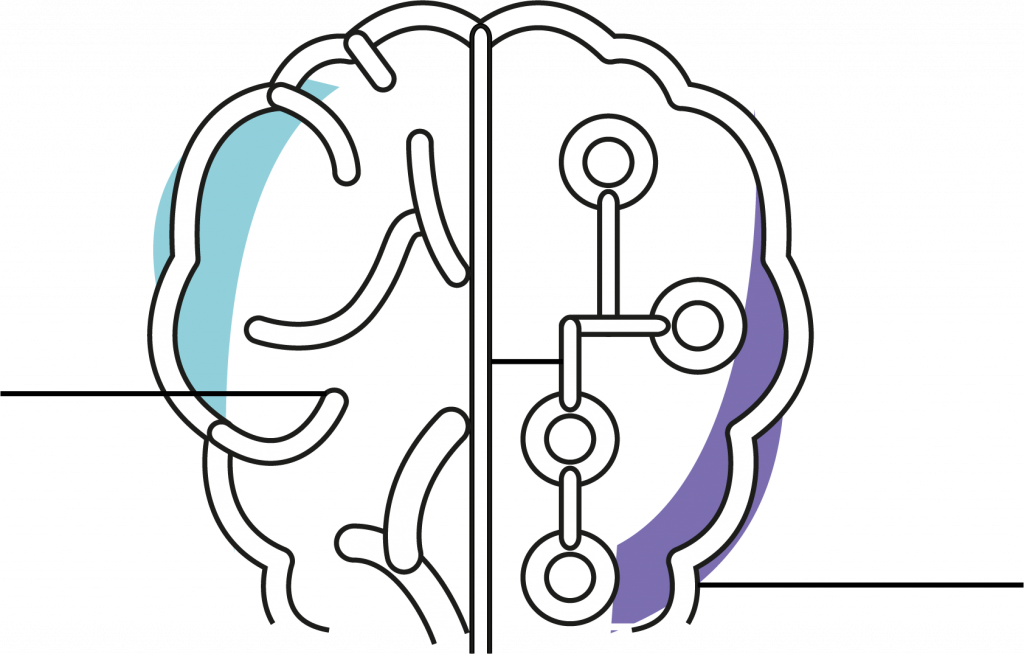Available Degrees
You will find here the search engine of the training offer of the University of Montpellier, to use it, simply enter the keyword « idil »:
MASTERS
Applied ecological and evolutionary sciences
- Ecology
- Evolution
- Study of variability

Biological and ecological sciences are increasingly linked to mathematical sciences in order to characterize the complex interactions and processes between organisms and their environments, the analysis and processing of large databases, etc. The Master IDIL Applied Sciences in Ecology and Evolution aims to train its students in the field of ecology and evolution, with a strong interface with mathematical sciences, statistics and numerical analysis.
This uncommon training will provide students with strong and competitive skills in the ecological and evolutionary sciences. This selective interdisciplinary training is open to students with a bachelor’s degree in ecology/evolution and/or mathematics. However, students must demonstrate a very strong interest in biology/ecology AND mathematics.
Contact

CHEMISTRY FOR HEALTHCARE, PROTECTION & NUTRITION
- Prodrugs and bioprecursors
- Nanotechnologies and multifunctional targeting
- Chemobiology
The Chemistry for healthcare, protection & nutrition applications master’s program focuses on the essentials of what guarantees humanity’s very existence, and goes far beyond that by organizing the crucial aspects of a healthy, sustainable life in harmony with its environment. Chemistry is at the heart of the vital concepts of caring, protecting and feeding human beings. This course offers you a multidisciplinary training around chemistry, enriched by biology, medicine and pharmaceutical sciences on one side and chemical engineering and material sciences on the other.
Having forged your ability to understand and analyze the diverse and complex issues of human health and its environment, capable of acting individually and as part of a team, and having acquired real international experience, you will be key players in public or private research programs. Having completed a bachelor’s degree in chemistry or any other equivalent, this course leads to in-depth and up-to-date training in molecular and macromolecular chemistry and materials chemistry applied to health and the environment (from eco-design to recycling), combined with research training in its leading laboratories.
Contact
Comparative politics and public policy
- International politics
- Political sociology of the elites
- European political institutions

The IDIL Master’s degree « Comparative Politics and Public Action » is a selective Master’s degree in political science open to multidisciplinarity. It focuses mainly on the fields of political sociology and public policy analysis.
Offered at the Faculty of Law and Political Science of the University of Montpellier, this master’s degree in political science (one of three in the institution) is the only one in France to be placed under the heading of « Comparative Politics. In this respect, it emphasizes sensitivity to international comparative openness as a research approach, in the profile of students and teachers and in the use of English as a working language.
The master’s program will preferentially welcome students with a bachelor’s degree or equivalent in political or social sciences but will also consider profiles from the humanities.
At the end of their training, Master’s graduates have the ability to work intensively, the capacity to synthesize, the mastery of methods allowing the analysis of complex situations and the knowledge of the political world and public action.
Contact
Laura Michel (academic)
Sylvia Gonçalves-Buadès (administrative)

Earth and water under global change
- Hydro-geophysics
- Geodynamics and plate tectonics
- Chemical and ecological risks
The Earth and Water Under Global Change (AWARE) master’s program focuses on the impact of global changes on agro-ecological, hydrological and geological processes, as well as their consequences on socio-ecosystems and the solutions adapted to deal with these major problems. It offers students a common base of cutting-edge courses, methodological and numerical tools, and customized training dealing with the impact of climatic and anthropogenic forces on the environment and the Earth’s resources. Environmental and health risks, geological risks, hydro-climatic risks and their impacts on agro-ecosystems, water resources, socio-hydrosystems or the coastal environment will also be at the heart of the transdisciplinary training offered by AWARE.
The program is supported by different research units grouped within the UNESCO ICIReWarD-Montpellier center, offering an optimal framework to study the impact of global changes on our planet, its resources and its environment.
Applicants should have a clear motivation for environmental sciences and for research training in water or earth sciences. The AWARE Master’s degree is associated with the GAIA (Earth and Water Sciences) doctoral school, which offers opportunities to pursue a doctorate.
Contact
Gilles Belaud (Water)
Delphine Roubinet (Earth)
eco-epidemiology of emerging diseases
- Ecology and evolution of microorganisms and parasites
- Transmission: études de cas
- Risks, risk analysis and monitoring
- Bioinformatics and databases
- Study of variability

The Eco-EPIED master’s degree responds to the contemporary challenge of emerging infectious and parasitic diseases in human and animal populations.
In light of the ecological, environmental and evolutionary analysis of these phenomena, this multidisciplinary program allows a synthetic approach. It integrates all relevant scientific skills and tools (including biology, statistics, bioinformatics as well as concepts from the human sciences) in different contexts and concrete needs of public health. Thus, Eco-EPIED is a One Health program dedicated to research and its concrete applications.
Recognized research units in Montpellier dedicated to the analysis and control of emerging diseases support the program. It also involves experts from international organizations, public health agencies, pharmaceutical companies and non-governmental organizations.
This interdisciplinary training is open primarily to students with a Bachelor’s degree in Life Sciences, Health Sciences and 4th year Pharmacy or Human Medicine. Secondly, students with a degree in Geography and Development, Social Sciences, Health and Social Sciences (their integration will be validated according to complementary training elements indicating their capacity to rapidly acquire skills in so-called « hard » sciences). Nevertheless, all students must have a very strong interest in the biology/ecology of pathogens, communicable diseases and epidemiology. And their academic and non-academic background must attest to their openness to a transdisciplinary approach including bioinformatics, statistics and human sciences. Fluency in scientific English (B2 level) is required. Autonomy and teamwork are also required.
Contact :

DIGItal and Movements sciences for Health (DIGIMOVE)
- Experimental design
- Signal processing
- Machine learning
- Perception-action dynamics and motor primitives
- Brain imaging for movement.
Le master IDIL DigiMove offre un cursus complet qui favorise les compétences dans la fusion de la recherche expérimentale, des sciences du mouvement humain et des sciences des données par une combinaison de cours et de stages.
Ce programme s’articule autour de trois axes principaux : La recherche expérimentale, y compris l’éthique de la recherche, la chaîne de mesure, les analyses statistiques, les outils mathématiques, les sciences du mouvement humain, y compris la biomécanique, le contrôle sensori-moteur et l’apprentissage, la physiologie de l’exercice, la psychologie de l’activité physique, et les sciences des données, y compris l’analyse des séries temporelles, la modélisation de la dynamique des systèmes, la visualisation des données, l’intelligence artificielle (apprentissage automatique), la science des données reproductibles.
Soutenus par un réseau de laboratoires dans la région de Montpellier, les étudiants travaillent en étroite collaboration avec les professeurs et les équipes de recherche, personnalisant leur formation en fonction de leurs objectifs individuels.
Pour s’engager dans ce parcours académique, les étudiants doivent avoir une forte motivation pour la recherche fondamentale et un bon niveau académique dans leur licence, de préférence en kinésiologie ou en informatique. Les spécialisations dans des domaines tels que la réadaptation, la physiologie de l’exercice, la psychologie du mouvement, les neurosciences du mouvement, les interfaces homme-machine, la science des données, l’apprentissage automatique ou le génie logiciel sont très appréciées. La maîtrise de l’anglais scientifique est un prérequis, et les compétences en matière d’autonomie et de travail en équipe sont essentielles.
Les diplômés de ce programme acquièrent des compétences avancées pour gérer des projets de recherche fondamentale ou de R&D dans le domaine des sciences de l’information et du mouvement avec des applications dans le domaine de la santé. Ils ont la possibilité de devenir ingénieurs en R&D ou de poursuivre un doctorat, ce qui peut conduire à des postes de recherche dans le secteur public ou privé.
Contact:

Management and sustainable transition
- Enterprise Risk Management
- Corporate Finance
- Performance management
The Master’s program « Management and Sustainable Transition » (MaST) aims to train management students in and through research, capable of dealing with the complexity of managerial phenomena related to the challenges of sustainable development. It prepares students for entry into doctoral studies and/or professional careers in companies or public organizations.
The MaST Master’s degree is open to national and international students with a Bachelor’s degree in management or equivalent. Candidates must have an excellent academic record and strong practical and theoretical skills in their discipline. They must be able to keep an eye on the major contemporary managerial issues and mobilize the concepts and tools necessary for management; they must master the principles of operation of an organization and be able to participate in the reflection and development of a strategy; They are able to debate and argue rigorously, to work in a team and with responsibility in the service of a project, to identify, select, analyze and synthesize knowledge with a critical mind; they have shown, through their experiences, an interest in the problems of sustainable development, particularly around environmental, food and health issues.
With the MaST pedagogical team, each student builds a personalized training plan oriented towards research, combining specialty courses, introductory courses in other related disciplines, methodology courses, personal and interdisciplinary team projects, and internships in research laboratories.
Contact :
Modeling Biological and environmental systems
- Stochastic processes
- Biological physics
- Simulation by finite elements

The Master’s program « Modeling of Environmental and Biological Systems » (MoBiEn) aims to train its students in quantitative and theoretical research of complex phenomena in living systems emerging at several scales: from the single molecule to living organisms, as well as their interaction with their environment.
The MoBiEn Master brings together scientists from different laboratories as well as professors from our 4 departments: Mathematics, Physics, Mechanical Engineering, and Computer Science. In this sense, it offers a coherent multidisciplinary program that makes MoBiEn a unique training whose core disciplines are Statistical Physics, Stochastic Processes, Biomechanics, Numerical Simulations, Statistical Methods, Advanced Data Analysis Techniques, and Artificial Intelligence.
The MoBiEn Master’s degree is open to highly motivated national and international students with a bachelor’s degree in Physics, Mathematics, or Mechanical Engineering, who wish to study phenomena at the interface between mathematics, physics, engineering, biology and ecology. Applicants should have an excellent academic record, robust mathematical skills, and a strong theoretical background in their discipline. Familiarity with numerical programming and computer-aided computation is appreciated. No prior theoretical knowledge of biology or environmental systems is required: students will learn the basics during the first year of the Master’s program.
Together with the MoBiEn pedagogical team, each student will develop a personalized research-oriented training plan that enhances his or her CV, skills, and scientific interests, by preparing measurable training objectives to be achieved at the end of each year. The training aims to prepare students for a PhD in basic research, or for professional opportunities in public or private research.
Contact :

Photonic & electronic sensors for environment and health
- Sensors & Associated systems
- Lasers & Photodiodes
- Technology & Design tools for sensors
- Photonics Instrumentation & Metrology
Sensors are omnipresent in our modern world. To give just a few examples: in the environment, they aim to detect and quantify the presence of pollutants in water or the atmosphere; in medicine, they allow 2D or even 3D imaging of the eye, arteries, or the early diagnosis of diseases. The most recent and efficient sensors are for the most part based on electronic or optical/photonic components without us even knowing it. In this context of an ever increasing and more challenging demand, the Master IDIL « Photonic & Electronic Sensors for Environment and Health » intends to train highly qualified personnel in the field of electronic and photonic sensors, with an orientation towards applications in environment and health, based on long stays in research laboratories. Graduates will then be able to choose to complete their training in order to become researchers in the public or private sectors, responsible for the development of new systems opening up the field of possibilities for the future.
The training is supported by the Institute of Electronics and Systems, a research laboratory of international scope in the field of sensors and photonics. Under the supervision of renowned researchers, you will learn to master the most up-to-date experimental techniques that will enable you to design and manufacture lasers, sensors, detectors and other key components using state-of-the-art technological equipment, including the application of components, particularly in the fields of environment and health.
Contact :
Plant and Microbiological sciences for agro-environment
- Mineral nutrition and adaptation of plants to abiotic constraints
- Microbial ecology
- Roles of microorganisms in ecosystems

The « Plant and Microbiological Sciences for the Agro-Environment » program offers training through research in the fields of plant sciences and microbiology. The training addresses the study of plants and microorganisms at the molecular and cellular levels, and at the level of the organism in interaction with its agro-environment.
The program is supported by a network of laboratories that is unique in the world, developing research work on a large number of themes in these vast disciplinary fields. The student’s training project is developed at the beginning of the Master’s program between the student, the teaching staff and a research team, allowing the customization of a specialized program in plant sciences or microbiology.
To follow this program, the student must have acquired a very good level of knowledge in molecular and cellular biology and genetics, on the one hand, and in plant physiology and microbiology, on the other. Knowledge of bioinformatics will be appreciated. A good command of scientific English is required. Autonomy and teamwork skills are necessary to follow this training. The student who graduates from this Master’s program will have acquired specialized skills in a research topic related to plant sciences or their interactions in the agro-environment, leading to the management of basic research or research and development projects.
Contact
Sciences for human health
- Cellular biology
- Functional genomics
- Current research in immunology

The multi-scale interdisciplinary research used in modern Bio-Health requires that people working in the field be trained in a wide range of disciplines. In this sense, the « Sciences for Human Health (SH2) » pathway provides a new training curriculum within a higher education institution for young scientists, ranging from Master to PhD, while bringing together people with different backgrounds.
Based on this observation, the program (SH2) implements a dual curriculum in medicine and biology, in order to train future leaders, scientists and health professionals in the field of Bio-health. The program provides a solid foundation in key disciplines and creates close links between education and research.
This training is intended for students from sciences and technologies in close interaction with the health field (physicians, pharmacists, odontologists).
The student must be motivated by basic research and have a degree in Life Sciences, with a specialization in one of the following 7 areas: Cancer Biology, Therapeutic Engineering and Bio-production in Biotechnology Health, Epigenetics, Genetics and Cell Biology (EpiGenBio), Infection Biology, Experimental and Regenerative Medicine (MER), Neuroscience, Quantitative Biology (qBio).
The « Sciences for Human Health (SH2) » program brings together advanced teaching and excellent research to develop innovative thinking in students and raise their awareness of the impact of the environment on human health. The research program is in line with MUSE’s ambition to support excellence in basic and clinical research in the field of bio-health. It offers multidisciplinary and integrative research, from genetics to molecular and experimental medicine, in order to develop quantitative biology and new therapeutic and diagnostic strategies for human health. This master’s degree prepares students for the quantitative and personalized medicine of tomorrow.
Contact
ENGINEERING DIPLOMA

Research and Innovation engineer diploma
The Engineering Research Course is structured around three engineering schools in Montpellier (Polytech Montpellier, ENSCM and the Agro Institute), and proposes to boost the training-research-innovation link while strengthening school/laboratory interactions around innovative projects.
The training of engineers through research is one of the paths of excellence for training students capable of embracing the complex themes of sustainable transitions, preserving energy, natural resources, biodiversity and the environment. It is a question of developing their critical sense, their scientific rigor, their creativity and their taste for innovation while developing the systemic vision that characterizes engineers.
This approach is organized in our schools with a common theme: « Sustainable transitions », and allows the development of multidisciplinary skills, responding to strong societal issues.
As part of the programs of these schools, the Engineering Research Program offers :
- Participation in an integration seminar bringing together students from the three schools, including an international conference on a Muse theme (Nourish, Care, Protect) and group work sessions on sustainable transitions;
- Transversal courses followed in common: experimental approach, writing scientific articles in English, research and bibliographic watch..;
- A work on a Research and Development project;
- The bibliographic study of a research project, the establishment of experimental protocols, the acquisition of data, the analysis and processing of results, the writing and learning of « peer reviewing » in compliance with good practices and research ethics. This project may eventually be the subject of a scientific publication and/or a patent.
- An end-of-study R&D internship in a public or private laboratory.
Contact
Pascal Benoit (Polytech)
Ghislain David (ENSCM)
Jean-François Martin (Institut Agro)